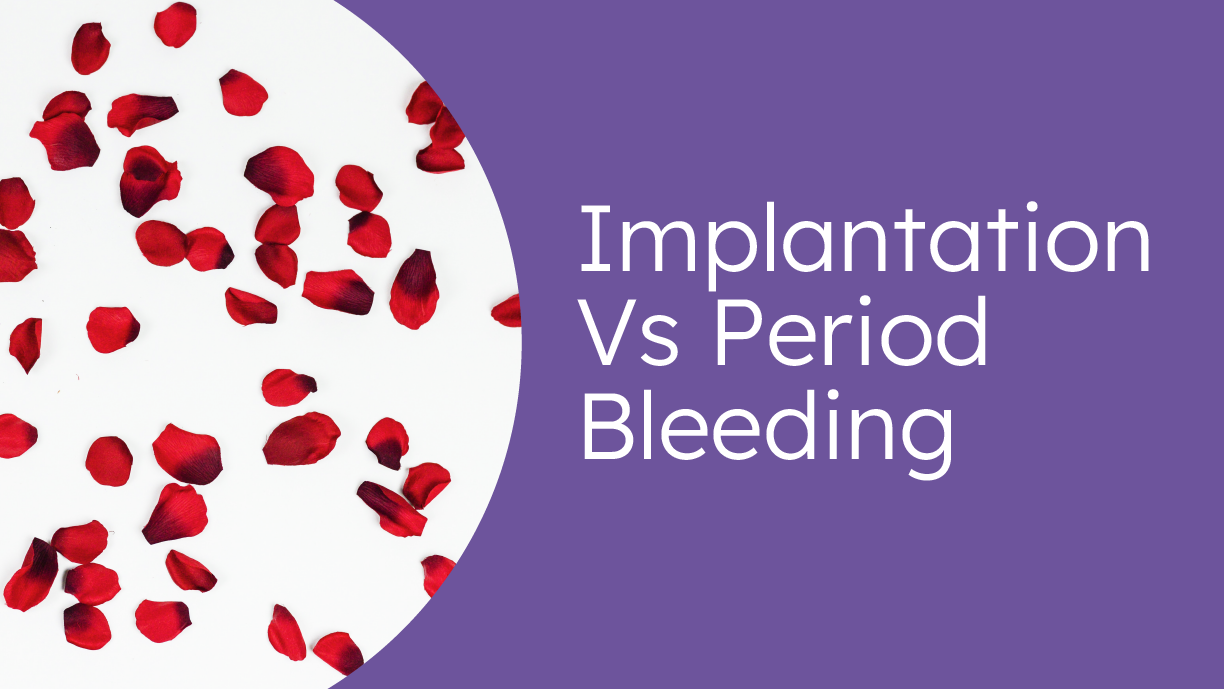You haven’t taken a pregnancy test, but you’re wondering if there could be any other early signs of pregnancy to give you a heads up. If it’s too early to get a positive pregnancy test, the symptoms may be minimal, but one of the first to occur may be implantation bleeding!
When an embryo is created, it travels to the uterus and begins to implant in the uterine lining. This is where it will stay throughout the entire pregnancy. Implantation can happen around 8-10 days after conception (when sperm meets egg) in successful pregnancies.
This timeline can mean that spotting 12 days after ovulation could be a sign that your period is starting early… or that an embryo is implanting! How can you tell the difference between implantation vs. period bleeding? Here are some signs and differences between both.

What are some signs of implantation bleeding?
When taking a look at your bleeding, it may be helpful to notice the differences between characteristics of implantation bleeding and your period. When experiencing implantation bleeding, you may notice the following:
Color
The color may be light pink or light brown, but very rarely is it bright red in color. This is because implantation bleeding is usually mild in nature due how tiny the action is. That implanting blastocyst is incredibly tiny!
Strength of Flow
Because of that, you can count on the bleeding associated with implantation to be light and mild. There can be many causes of bleeding in early pregnancy, but implantation has not been known to cause heavy bleeding.
Length of Flow
This means you can also pay attention to the length of your bleeding as a good indicator. Are you having a day or two of mild spotting (whether pink or brown), or does that spotting continue for many days and/or develop into a moderate or heavy flow? If it’s either or the latter, it’s much more likely to be something else besides implantation bleeding.
Clotting
Clotting is caused by an abundance of blood in the uterus that is slowed on its way to exit the vaginal opening. In order to help this mass of blood pass, the body causes it to clot. Clotting is not associated with implantation bleeding, because the amount of bleeding is not heavy enough.
Positive Pregnancy Test
Implantation bleeding occurs most commonly before you can experience a positive pregnancy test, but if you have light spotting (pink or brown) that lasts less than 48 hours without developing into a heavier flow, you may be one of the few women who experience implantation bleeding! The best way to confirm this is to take a pregnancy test at least 12 days after "trying."
How is menstrual bleeding different?
Implantation bleeding and menstrual bleeding look differently and act differently because they are responses to totally different bodily functions!
When implantation bleeding occurs, it’s in response to the implantation of the tiny blastocyst into the uterine lining, causing disruption to the uterine lining where blood and tissue abound.
When you experience menstrual bleeding (a.k.a. your period), it’s because your body detects no implanted blastocyst and hormone levels are dropping so that you can begin your ovulatory cycle again.
Color
There can be a variety of colorings involved in the flow of a period, but the majority of that flow will be bright red. This is a sign of active shedding of the entire uterine lining.
Strength of Flow
Because your body is shedding the entire lining of the uterus, the bleeding can be heavy. Each period has at least one day of moderate or heavy bleeding before slowly reducing. You may notice that it begins heavily and ends with spotting. You may also notice that your period begins with spotting before getting to a heavy flow. This is not unusual, and is only a concern if it lasts multiple days.
Length of Flow
The length of the menstrual flow will vary from person to person, but a healthy menstrual flow should be at least 3 days and no longer than 7. (This includes any days of spotting both before and after the heavy flow.)
Clotting
Unlike implantation bleeding, clotting happens more commonly during menstrual periods. This is because the volume of blood is much greater during a period than during implantation bleeding. However, if you notice clots that are large in size, difficult to pass, or accompanied by excessive bleeding (a tampon or pad every hour for several hours), notify your doctor for guidance.
Negative Pregnancy Test
If your bleeding has picked up, but you’re not sure if it’s your period or implantation bleeding, the next step is to take a pregnancy test. A heavy or moderate flow accompanied by a negative pregnancy test most often means there is no active pregnancy. If you need a more detailed result, you can also request a beta hCG lab draw from your doctor.
What are some early signs of pregnancy?
Tender breasts
As soon as implantation occurs, your body begins producing the pregnancy hormone known as hCG. This is the same hormone that a pregnancy test reads to give you a positive pregnancy test.
This hormone also causes the breasts to begin a critical transformation during the first weeks of pregnancy to allow them to eventually lactate. Many women describe this as their first sign of pregnancy, because it can make those girls very tender!
Nausea and vomiting
While traditional “morning sickness” may not begin until at least 6 weeks of pregnancy, increasing sensitivity to smells and environments can cause mild nausea to begin even earlier.
Fatigue
Pregnancy, even as early as implantation, can cause the body to go into power-save mode as it puts all its available energy toward the development of the placenta and baby. If you notice you’re falling asleep on the couch in the evenings, it may be a sign that your body is up to something: pregnancy!
Are you still concerned about irregular bleeding? Then we recommend consulting your doctor.















